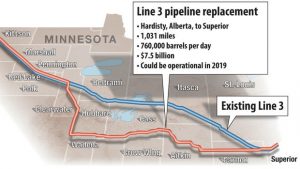Businesses are often proposed with the opportunity of taking risks which could potentially enable them to prosper. Although ostensibly intimidating, risk-taking is essential, and can act as the living embodiment to a successful company. However, companies can sometimes find themselves taking risks that breach the ethical code, and thus inevitably receiving pressure from various protesting groups.
This is demonstrated in a recent article concerning the construction of the Enbridge 3 Line, which would increase the capacity of the already existing pipeline, running “from Hardisty, Alberta, clip[ping] a corner of North Dakota, and cross[ing] Minnesota.” The issue at hand not only pertains to underlying ethical issues with the construction of pipelines in general, but also entails key concepts including assessing the potential risk and reward of pipeline construction from a financial standpoint.

An image showcasing a few details pertaining to the construction of Line 3, in comparison to the existing pipeline.
Environmentalist groups are horrified at the consequences of a potential oil spill, which would not only be detrimental to Enbridge’s assets, but most importantly the environment. Within this situation, there are two outcomes- one in which Enbridge must accept the unlimited liability of a potential oil spill, or one where they produce significantly more barrels of oil per day. Enbridge is desperately gambling on the latter, ultimately showcasing Milton Freidman’s Shareholder Theory by seeking to maximize profit, and further ignoring the immense backlash received by many environmentalist groups.
Enbridge’s actions can be further analysed through assessing their investment decisions with respect to both long-term and short-term benefits. From a financial standpoint, the transportation of oil is essential to create successful trade relations with other countries, thus the expansion of Enbridge’s Line 3 serves as a long-term financial investment. Its cost of construction, valued at 7.5 billion dollars and multiple years of labor will have a great trade-off; by creating significantly more barrels of oils per day, Enbridge will be able to provide petroleum shippers and refineries in the region with greater amounts, to create greater profit. As great as the long-term may sound, Enbridge is currently suffering short-term effects including heavy protest from locals.
However, the outcry of many environmentalist groups raises the question: Realistically, what are Enbridge’s options?
The current safest means of transporting oil is through pipelines, by using strong steel to minimize any potential incident. Alternatives including railroads have a greater margin for error; it is vital to acknowledge that “as environmentally disastrous and common as pipeline leaks are, the alternative may be worse.” In a world where certain trade relations rely on oil, I believe that companies and governments must be willing to take the risk, of-course, whilst taking heavy precautions.
At the end of it all, if Enbridge succeeds in their public hearing, they could find themselves with deep pockets. However, the construction of pipelines is almost rarely a two-way street- rising tension may very well ensure that Line 3 never sees the day.
Word Count: 448



